|
|
|
Sort Order |
|
|
|
Items / Page
|
|
|
|
|
|
|
| Srl | Item |
| 1 |
ID:
127343
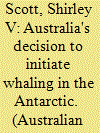

|
|
|
|
|
| Publication |
2014.
|
| Summary/Abstract |
On May 31, 2010, Australia instituted proceedings before the International Court of Justice in the case of Whaling in the Antarctic (Australia v. Japan). Although Australian politicians had for some time threatened such a course of action, the decision to proceed with international litigation took many observers by surprise, most basically because Japan appeared to be in a strong legal position and the risks associated with the case appeared greater than Australia's prospects for success. This article examines the background to the whaling dispute and suggests two ways in which litigation in the World Court may contribute to resolution of the dispute no matter the legal outcome of the case.
|
|
|
|
|
|
|
|
|
|
|
|
|
|
|
|
| 2 |
ID:
148500


|
|
|
|
|
| Summary/Abstract |
John Mearsheimer has compared China’s attitude towards the South China Sea to the Monroe Doctrine of the United States. Mearsheimer does not accord international law much weight and certainly does not regard it as determinative of political outcomes. But many observers of China’s disputes in the South China Sea look to international law for rules and processes that could facilitate peaceful resolution of the disputes. In doing so they are variously puzzled, bemused, and/or angered by China’s assertion of the nine-dash line (南海九段线). This article draws more broadly on the literature on the Monroe Doctrine, viewing the doctrine as: a unilateral pronouncement of foreign policy; representing resistance; embedded in domestic as opposed to international law; and an assertion of legitimate regional hegemony. Through applying the analogy of the Monroe Doctrine, the article seeks fresh insights into China’s legal position in relation to the South China Sea and into the significance of the nine-dash line in terms of international law.
|
|
|
|
|
|
|
|
|
|
|
|
|
|
|
|
| 3 |
ID:
076863


|
|
|
|
|
| Publication |
2007.
|
| Summary/Abstract |
The perceived legitimacy of US foreign policy plummeted in the wake of the US-led 2003 invasion of Iraq. Most commentators would agree that international law, or at least US actions in relation to international law, had something to do with this decline. But, what the recent debate as to how best to restore US legitimacy has starkly revealed, is that we know little as to just how international law accords legitimacy to certain foreign policy endeavours. While the legality of the action may have much to do with it, the relationship between international law, foreign policy and legitimacy appears to be more complex than is suggested by a straightforward legal-illegal categorization of behaviour. A theorization of international law as ideology can provide an overall explanation of the role of international law in the decline in US foreign policy legitimacy following the invasion of Iraq
|
|
|
|
|
|
|
|
|
|
|
|
|
|
|
|
| 4 |
ID:
168379
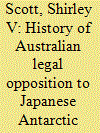

|
|
|
|
|
| Summary/Abstract |
Whaling has been a consistent theme in Australia’s relations with Japan since the 1930s, Australia having endeavoured to regulate, restrict, or bring to a complete halt Japan’s Antarctic whaling virtually since it began. Australia’s motivations have been mixed, involving at various points, some combination of protection of Australia’s coastal whaling industry, concern for Australia’s security, for safeguarding Australia’s Antarctic territorial claim, and more recently, concern for Australia’s whale-watching industry and/or for the whales. Since environmental consciousness became a primary factor in the 1970s, Australian policy has been aligned with that of anti-whaling non-governmental organizations (NGOs), albeit that certain actions of NGOs have caused difficulties for the Australian Government. Law – inclusive of legal argument in the course of diplomacy, domestic laws, and international litigation – has been a mechanism of influence used by the Australian Government and NGOs. This paper traces Australia’s legal opposition from its beginnings until Japan’s announcement in December 2018 that it would end Antarctic whaling.
|
|
|
|
|
|
|
|
|
|
|
|
|
|
|
|
| 5 |
ID:
142431
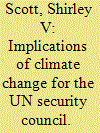

|
|
|
|
|
| Summary/Abstract |
Over the last decade there has been an evolving debate both within the United Nations and within the scholarly literature as to whether it would be feasible, appropriate and/or advantageous for the United Nations Security Council (UNSC) to consider climate change to be within its remit. Given that irreversible global warming is under way and that this will inevitably have multiple global security implications—and indeed, that the Council has to some degree already addressed the issue—such a debate has become anachronistic. What is needed at this stage is nuanced analysis of how this complex policy issue may have already impacted, and may in future impact, the function and functioning of the Council. This article first reviews key variables that need to be taken into account in moving beyond a binary discussion of whether or not the Security Council should consider climate change. It then maps four broad categories of possible UNSC response, spanning from rejection of any involvement through to the Council using its Chapter VII powers and functioning as the peak body in respect of global climate change governance. It then places developments to date within those categories and concludes by considering the prospects for an increased UNSC role in the future.
|
|
|
|
|
|
|
|
|
|
|
|
|
|
|
|
| 6 |
ID:
079899
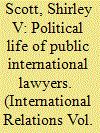

|
|
|
|
|
| Publication |
2007.
|
| Summary/Abstract |
The intervention of international lawyers in public debate in the US, UK and Australia regarding the 2003 invasion of Iraq spotlighted the political agency of international lawyers in according or withholding legitimacy from major foreign policy decisions and raised the question of how to delimit the scope of international lawyers' political agency. Rejecting the close fit of either the transnational advocacy network or epistemic community concepts to the role played by the collectivity of international lawyers, this article identifies factors that both permit international lawyers to function as the grantors or withholders of foreign policy legitimacy and serve to define the limits on their fulfilling that role
|
|
|
|
|
|
|
|
|
|
|
|
|
|
|
|
| 7 |
ID:
085423
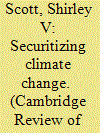

|
|
|
|
|
| Publication |
2008.
|
| Summary/Abstract |
On 17 April 2007 the United Nations Security Council held its first debate on climate change, energy and security. Since then, and despite a number of reports emphasizing the security implications of climate change, there has, at least in diplomatic circles, been a move away from the previous trend towards accepting climate change as a question of international security. This is primarily due to the possibility of the Security Council taking the lead in coordinating global efforts to mitigate, or adapt to, climate change. Developing countries interpret this possibility as a rejection of the principle of common but differentiated responsibilities as incorporated into the United Nations Framework Convention on Climate Change. The increasing urgency of taking decisive action means that it is too early to rule out a role for the Council with its coercive powers. Ultimately, however, the success of any international regulations will depend on their political legitimacy.
|
|
|
|
|
|
|
|
|
|
|
|
|
|
|
|
|
|
|
|
|